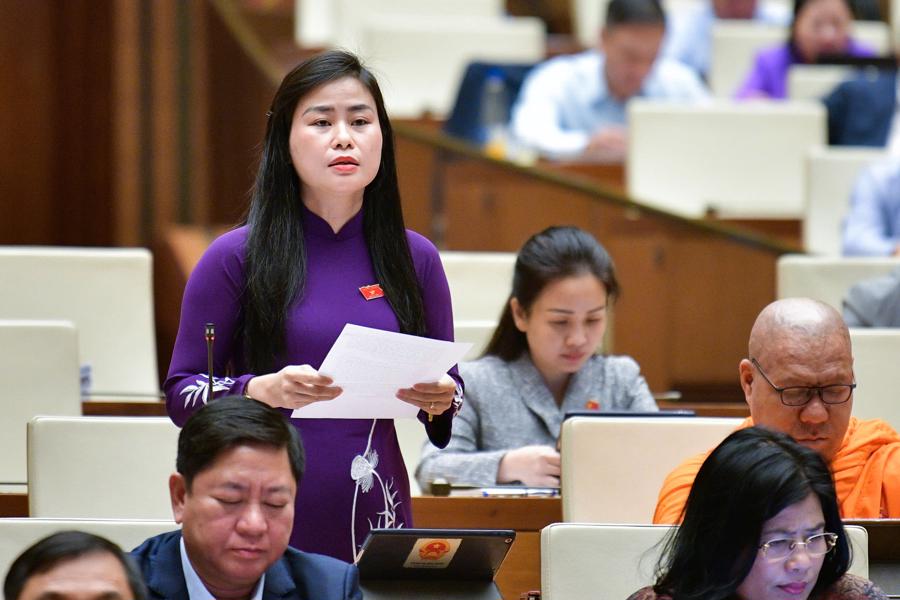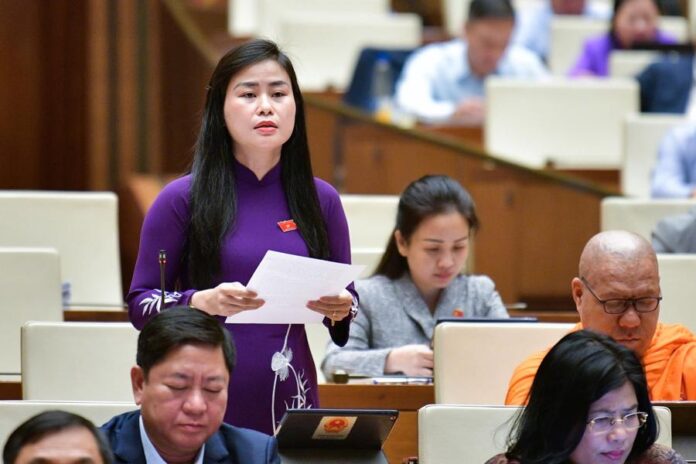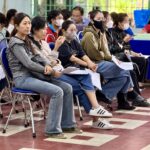On the morning of November 27th, the National Assembly, chaired by Mr. Tran Thanh Man, continued the 8th session by discussing the amended Law on Employment.
## UNEMPLOYMENT BENEFITS ARE INADEQUATE TO COVER BASIC LIVING EXPENSES
During the discussion, Ms. Dang Thi Bao Trinh, a representative from Quang Nam province, argued that the current monthly unemployment benefit, which is 60% of the average monthly salary of the last six insured months, is insufficient. She proposed increasing this amount to 75%, aligning it with the maximum pension level. This change is a common aspiration among workers, as it would provide them with a basic standard of living during unemployment and discourage them from withdrawing social insurance in a lump sum.

Mr. Dieu Huynh Sang, a representative from Binh Phuoc province, agreed that amending the Law on Employment is necessary to meet state management requirements and address sustainable employment issues, aligning with international integration trends. He expressed concern about the eligibility conditions for unemployment benefits, questioning what would happen if a worker was unfairly dismissed or forced to leave their job illegally. He suggested that the draft law should clarify whether workers in such situations would be eligible for benefits during the potentially lengthy process of filing complaints or taking legal action.
Regarding the benefit amount, Mr. Sang pointed out that the current monthly unemployment benefit is only 60% of the average monthly salary of the last six insured months, subject to a maximum of five times the regional minimum wage published by the government. In reality, this amount is insufficient to cover even personal expenses, let alone family expenses, as most businesses pay insurance based on the regional minimum wage (approximately 4 million VND per month), resulting in a benefit of around 2.5 million VND per month. Therefore, he proposed increasing the monthly benefit to 75% of the average monthly insured salary to align with today’s living standards.
## PROPOSAL TO REMOVE THE CAP ON UNEMPLOYMENT BENEFIT DURATION
The draft law stipulates that the duration of unemployment benefits is calculated based on the number of months of insurance contributions. For every 12 months of contributions up to 36 months, three months of benefits are provided. For each additional 12 months, one more month of benefits is added, up to a maximum of 12 months. Mr. Sang suggested that the drafting committee consider removing the phrase “up to a maximum of 12 months,” adhering to the principle of “contribution-based benefits.”
He also proposed removing the time limit on benefit duration to align with the provisions of the Labor Code regarding severance pay. According to the Labor Code, employers are responsible for paying severance pay to employees who have worked continuously for at least 12 months. For each year of service, employees are entitled to half a month’s salary, without any limit on the benefit period. This proposal would harmonize the unemployment benefit duration with the current severance pay regulations.
## PROPOSAL TO INCLUDE EMPLOYERS’ RESPONSIBILITY FOR DELAYED OR UNPAID UNEMPLOYMENT INSURANCE CONTRIBUTIONS
Ms. Nguyen Hoang Bao Tran, a representative from Binh Duong province, emphasized the importance of unemployment benefits, counseling, and vocational training support in helping unemployed individuals find new jobs quickly and stabilize their lives. However, she acknowledged that these benefits cannot replace their entire income over an extended period, especially considering that the current benefit is only 60% of the average monthly salary of the last six insured months. Given the surplus in the Unemployment Insurance Fund in recent years, she proposed increasing the benefit to 70% of the average monthly salary of the last six insured months, with a minimum amount equivalent to the regional minimum wage and a maximum of five times that amount.
Ms. Tran emphasized that this change would provide financial stability for unemployed individuals, allowing them to focus on job searching without financial worries. Additionally, it would encourage more people to participate in unemployment insurance, increasing the fund’s revenue and enhancing the effectiveness of the policy. She also drew attention to the draft law’s provision allowing employees to use their money to contribute to the fund if their employer is unable or unwilling to pay unemployment insurance. She argued that this could cause dissatisfaction among workers, as they would have to bear the financial burden themselves if their company fails to fulfill its obligations.
To address this issue, Ms. Tran suggested including regulations that clearly define the responsibility and consequences for employers who do not fulfill their insurance obligations. She proposed that employers should be held liable for compensating their employees if they fail to make timely unemployment insurance contributions. Additionally, she recommended that the government consider providing temporary funding to ensure uninterrupted benefits for workers and requiring companies to reimburse the full amount of unpaid insurance contributions, along with corresponding interest.
From an enterprise perspective, Ms. Tran also suggested exploring mechanisms to defer, postpone, or reduce unemployment insurance contributions for businesses facing financial difficulties, especially during economic downturns, natural disasters, or pandemics. These measures would contribute to a more robust and efficient legal framework for managing unemployment insurance, balancing the interests of both employees and employers and fostering a fair and sustainable work environment.
The Endless Commute: Navigating the Unemployment Benefits Maze
Streamlining processes and procedures while remaining agile in the acceptance and handling of unemployment benefit claims is pivotal to upholding the principles of unemployment insurance.
The Latest on Unemployment Insurance
The proposed Employment Law (amended) is designed to enhance accessibility for businesses and citizens to avail themselves of unemployment insurance benefits. It also aims to provide training and skill enhancement programs to improve overall employability and empower individuals to achieve greater career success.
The Great Gojek Driver Scramble: The Race for Employment
As of September 16th, the online ride-hailing platform Gojek will cease operations in Vietnam. This has left a significant number of drivers struggling to find a new platform to partner with.









































